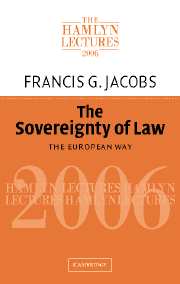Book contents
- Frontmatter
- Contents
- The Hamlyn Trust
- The Hamlyn Lectures
- Preface
- 1 Introduction
- 2 The rule of law in Europe
- 3 The European Convention on Human Rights and the rule of law
- 4 The European Union and the rule of law
- 5 Fundamental values
- 6 Courts and free markets
- 7 The European Union today: some achievements
- 8 The European Union today: some problems
- Afterword
- Index
Afterword
Published online by Cambridge University Press: 29 July 2009
- Frontmatter
- Contents
- The Hamlyn Trust
- The Hamlyn Lectures
- Preface
- 1 Introduction
- 2 The rule of law in Europe
- 3 The European Convention on Human Rights and the rule of law
- 4 The European Union and the rule of law
- 5 Fundamental values
- 6 Courts and free markets
- 7 The European Union today: some achievements
- 8 The European Union today: some problems
- Afterword
- Index
Summary
We have seen in this book how new tasks are imposed on the courts. The functions of law have changed in recent years. Courts must now, for example, seek to strike the balance where competing values conflict. They have a role in developing policy as well as in settling disputes.
At first sight it may seem that the courts are not well placed to respond to these challenges, which go well beyond deciding the instant case. Traditionally, courts are, for the most part, concerned with deciding individual cases – although the task of the European Court of Justice, in giving preliminary rulings, can be seen to have a broader significance. Under this procedure, its rulings are intended, not only to resolve the issue arising in the instant case, but also to settle the matter for all courts in the European Union confronted with the same questions.
It can also be argued that fundamental choices should be made by a democratically accountable legislature, rather than by the courts. But our survey has shown, I think, that that is not always a workable solution. Courts will always be left with the last word.
To a large extent, the courts' new tasks are unavoidable. But they also have the advantage of new methods of addressing the issues.
One is through dialogue between courts in different systems: they look at each other's decisions far more than in the past. They decide explicitly whether solutions adopted elsewhere are appropriate in their own systems.
- Type
- Chapter
- Information
- The Sovereignty of LawThe European Way, pp. 153 - 154Publisher: Cambridge University PressPrint publication year: 2007

